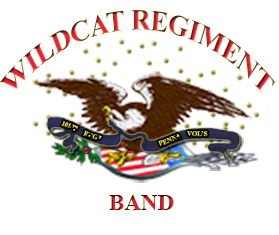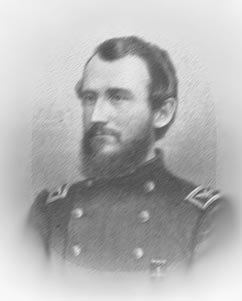History of the One Hundred and Fifth Regiment
of
Pennsylvania Volunteers.
A Complete History of the Organization, Marches, Battles, Toils, and Dangers Participated in by the Regiment,
From the Beginning to the Close of the War.
1861-1865
by
Kate M. Scott
Philadelphia: New-World Publishing Company, 1877.
The Band, by a Member
The efficient brass band of the One Hundred and Fifth Regiment Pennsylvania Volunteers is deserving of more than passing mention in this volume, and therefore a brief history of their organization and camp life is herewith respectfully submitted. The band was recruited in 1861, by Messrs. John C. Smith, of Indiana, Pa., and John T. Strattan, of Strattanville, Pa., and consisted of the following-named gentlemen, viz.
A permanent organization was effected at Camp Jameson, near Alexandria, Va., in October, 1861, with John C. Smith leader and director. Colonel McKnight immediately ordered the construction of a spacious practicing-room, which was completed without delay, and, from the liberal contributions of himself and brother officers of the regiment, a new set of instruments was purchased at a cost of over one thousand dollars, and the band at once entered into vigorous practice, eliciting in a very short time the applause and admiration of all who heard them, as well as many compliments from the Colonel, who was ever ready to assist them in any manner conducive to their comfort or looking to their proficiency. Their reputation was early established, and, consequently, posts of honor were frequently assigned them at brigade and division reviews; and the band never felt prouder than when marching on these occasions at the head of the famous and praiseworthy "Wild-Cat Regiment," which gained its well-earned notoriety in many a hard-fought battle during the war. It might here be mentioned that, in the spring of 1862, the continued illness of Professor John C. Smith compelled him to resign the leadership of the band, and John T. Strattan was appointed leader and director, under whose supervision the band made rapid progress, and its then enviable reputation was still further enhanced, which it maintained throughout until its final discharge at Harrison's Landing.
During our six months of camp life at Camp Jameson, Virginia, many amusing incidents occurred in the band, which, no doubt, will long be remembered and treasured up as food for many a hearty laugh in future, when any of the boys meet; and, although the band were noted for their uniform decorum and strictly temperate habits, yet, for amusement and fun, I venture to say, their rivals were not found in the Army of the Potomac. During the month of March, 1862, our first-basso player, Mr. James Mooney, owing to pressing business interests, resigned and went home. His talent was sadly missed in the band; for “Jim” is not only a first-class performer, but a good fellow. He served with distinction in the Mexican war, and still suffers from wounds received at the famous battle of Molino del Rey. In 1864 he again enlisted in the band of the Second Pennsylvania Artillery, and was wounded in the wrist by a fragment of shell during an action near Petersburg, Va. The band participated in nearly all the engagements of the regiment during the Peninsular campaign, from Fortress Monroe to Harrison's Landing, on the James river. Their duty, during an action, was to assist in carrying off the wounded, and to afford them temporary relief until brought before the surgeon. For this purpose they were provided with stretchers, tourniquettes, lint and bandages, and were organized into squads of five during an engagement. After the battle of Williamsburg, and before the retreating rebels were clearly out of sight, the One Hundred and Fifth Regiment, with its gallant officers, was the first to enter the city. The City Hotel was immediately occupied by Colonel McKnight as provost-marshal, and the band of the One Hundred and Fifth was stationed on the balcony, and the citizens treated to the strains of "Yankee Doodle" for the first time in that city since the breaking out of war.
The next notable engagement of the regiment was at Fair Oaks, or Seven Pines, where the regiment lost heavily in officers and men. Here the gallant Captain Dowling was killed and buried near the battle-field. All the available bands in the corps were stationed (by order of General Heintzelman) on the main road leading to the battle-field, and, despite the deafening roar of cannon and musketry, the strains of the national airs could be distinctly heard by our troops, having a good effect, in affording them encouragement and urging them on to victory under such perilous circumstances. Our troops were in possession of the field during the afternoon, and established a permanent camp within sight of Richmond. Several members of the band were quite ill during our stay at this point, but, under the skilful treatment of the surgeons all recovered but Alvin Ross, who died, I believe, from typhoid fever. Mr. Ross was from Clearfield, Pa.; a genial, good fellow, and beloved by all who knew him. His death was sadly lamented. The memorable Seven Days’ fight succeeded the battle of Fair Oaks, and, during the second day of the retreat, the band met with a serious misfortune to their instruments—I think, just previous to the engagement near White Oak Swamp. The Colonel ordered the band to stack instruments, knapsacks, and get the stretchers ready. The instruments, etc., were left without any special guard for their safety, and the result was, a large army wagon passed over the pile of horns, demolishing about one-half of them. No casualty of moment occurred to any member of the band during the retreat; many of the boys narrowly escaped being "gobbled by the rebs," and John Fisher, of St. Mary’s Pa., was knocked over and stunned at the battle of Malvern Hill, by his close proximity to a large cannon-ball from one of the rebel batteries. The march from Malvern Hill to Harrison's Landing was attended with more fatigue than any previous portion of the retreat, as it commenced raining the day after the fight, and continued until our arrival at the James river, where the army went into permanent quarters.
On the 13th of August, 1862, the band was discharged by Act of Congress, approved July 17, 1862, discharging all regimental bands, and, after an affectionate farewell of the regiment, took the steamer for Baltimore. We kept up the organization until our arrival there, when, on the following day, we disbanded, many of us, perhaps, never to meet again. As it has been impracticable to effect a re-union of the band, owing to extreme points of residence in the United States, the writer has conferred with most of them by letter; and it is the unanimous request of the band that we herein express to all the surviving officers and privates of the gallant old One Hundred and Fifth our heartfelt thanks, as a feeble token of our gratitude for many kind courtesies and favors bestowed while in the line of duty. To the brave and true officers and men of our regiment who fell in defence of their country’s flag we owe a profound and lasting debt of gratitude, and will cherish, with softened hearts and warm affection, their honored memories; and we, who still survive, can join our comrades in the silent tomb, with a restful trust in Almighty God that our labors and sacrifices, our marches, our battles, and our victories shall not have been in vain.

